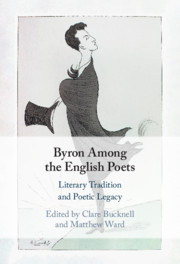Book contents
- Byron Among the English Poets
- Byron Among the English Poets
- Copyright page
- Dedication
- Contents
- Contributors
- Acknowledgements
- Abbreviations
- Introduction
- Part I Inheritances
- Part II Contemporaries
- Chapter 8 ‘I ne’er mistake you for a personal foe’: Byron and Wordsworth
- Chapter 9 The Year of Publishing Dangerously: Barbauld and Byron in 1812
- Chapter 10 Strange Designs: Byron, Shelley and Ottava Rima
- Chapter 11 Byron, Keats and the Time of Romanticism
- Chapter 12 Broken, Wild, Untold Tales: Byron’s Orientalist Poetry and Romantic-Period Narrative Verse
- Chapter 13 ‘Lord Byron, poh! the man wot writes the werses?’: John Clare, Byron and Class
- Part III Afterlives
- Index
Chapter 13 - ‘Lord Byron, poh! the man wot writes the werses?’: John Clare, Byron and Class
from Part II - Contemporaries
Published online by Cambridge University Press: 22 July 2021
- Byron Among the English Poets
- Byron Among the English Poets
- Copyright page
- Dedication
- Contents
- Contributors
- Acknowledgements
- Abbreviations
- Introduction
- Part I Inheritances
- Part II Contemporaries
- Chapter 8 ‘I ne’er mistake you for a personal foe’: Byron and Wordsworth
- Chapter 9 The Year of Publishing Dangerously: Barbauld and Byron in 1812
- Chapter 10 Strange Designs: Byron, Shelley and Ottava Rima
- Chapter 11 Byron, Keats and the Time of Romanticism
- Chapter 12 Broken, Wild, Untold Tales: Byron’s Orientalist Poetry and Romantic-Period Narrative Verse
- Chapter 13 ‘Lord Byron, poh! the man wot writes the werses?’: John Clare, Byron and Class
- Part III Afterlives
- Index
Summary
In his social context, ‘peasant poet’ John Clare was not odd in being a constant reader of the ‘aristocrat poet’ Lord Byron. Even after the latter’s attacks in English Bards and Scotch Reviewers on ‘cobbler’ poets, along with all ‘sons of needless trade’ who might rhyme (‘weavers’, ‘taylors’, labourers with ‘plough’ or ‘spade’), Byron remained a leading influence on labouring-class poets’ work.1 Introducing his volume of labouring-class poetry of the first thirty years of the nineteenth century, Scott McEathron argues that along with Burns and Bloomfield, Byron loomed large for poor poets, including Clare:
perhaps partly because of his avowed hostility, he served several of these figures as a force to grapple with, to imitate, and sometimes to impersonate. Further, the aggressive self-indulgence of his verse, especially Don Juan but including Childe Harold’s Pilgrimage, seems to have suggested a new avenue of artistic empowerment, and his influence is clear (and often announced) in the vein of wit, satire, and iconoclasm.2
- Type
- Chapter
- Information
- Byron Among the English PoetsLiterary Tradition and Poetic Legacy, pp. 219 - 232Publisher: Cambridge University PressPrint publication year: 2021

